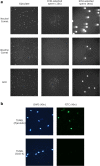Sperm selection during ICSI treatments reduces single- but not double-strand DNA break values compared to the semen sample
- PMID: 33660206
- PMCID: PMC8190426
- DOI: 10.1007/s10815-021-02129-w
Sperm selection during ICSI treatments reduces single- but not double-strand DNA break values compared to the semen sample
Abstract
Purpose: To detect a possible bias in sperm DNA fragmentation (SDF) testing when performed on semen samples or on those few spermatozoa selected for Intracytoplasmic Sperm Injection (ICSI) treatments.
Methods: A multimethodological analysis of Single- and Double-Strand DNA Breaks (SSB and DSB, respectively) was performed through the Neutral Comet, the Alkaline Comet, the Sperm Chromatin Dispersion (SCD) and the Terminal deoxynucleotidyl transferase dUTP Nick End Labelling (TUNEL) assays. SDF was evaluated in (i) semen samples from 23 infertile patients (not achieving pregnancy or suffering recurrent miscarriage); (ii) samples after a Swim-up and (iii) spermatozoa microselected for ICSI (ICSI-S).
Results: The analysis of 3217 ICSI-S revealed a significant reduction of SSB values compared to the Ejaculate and the Swim-up samples. On the contrary, DSB values were not reduced after any sperm selection method. The No-pregnancy group presented poorer semen parameters and higher SSB values. The Recurrent miscarriage group presented better semen parameters but also higher DSB values.
Conclusion: The analysis of SDF on semen samples may not be fully representative of those few spermatozoa selected for ICSI. Since oxidative stress impairs sperm motility and causes SSB, selecting a motile sperm may intrinsically imply choosing a sperm not affected by this damage. DSB have an enzymatic origin which does not affect motility, making it difficult to select a sperm without this damage. Therefore, ICSI treatments could be effective in patients presenting high SSB values. Patients presenting high DSB values should expect bad ICSI results if this damage is not reduced through other specific methods.
Keywords: Comet assay; Double-strand breaks; ICSI; Sperm DNA fragmentation; Sperm selection.
Conflict of interest statement
AGP is the director of the CIMAB centre, a university spin-out company with a commercial interest in SDF testing. No other author has a conflict of interest to declare.
Figures


Similar articles
-
Microfluidic sperm sorting improves ICSI outcomes in patients with increased values of Double-Strand Breaks in sperm DNA.Rev Int Androl. 2023 Jan-Mar;21(1):100338. doi: 10.1016/j.androl.2021.10.003. Epub 2022 Nov 2. Rev Int Androl. 2023. PMID: 36335071
-
Can a sperm selection technique improve embryo ploidy?Andrology. 2023 Nov;11(8):1605-1612. doi: 10.1111/andr.13362. Epub 2022 Dec 28. Andrology. 2023. PMID: 36484212 Free PMC article.
-
Impact of Microfluidic Sperm Sorting on Embryonic Euploidy in Infertile Patients with Sperm DNA Damage: A Retrospective Study.Int J Fertil Steril. 2024 Oct 30;18(4):417-423. doi: 10.22074/ijfs.2024.2007775.1499. Int J Fertil Steril. 2024. PMID: 39564835 Free PMC article.
-
How to select healthy sperm for intracytoplasmic sperm injection in samples with high sperm DNA fragmentation?Panminerva Med. 2023 Jun;65(2):148-158. doi: 10.23736/S0031-0808.23.04870-X. Epub 2023 May 16. Panminerva Med. 2023. PMID: 37194246 Review.
-
Association between sperm DNA fragmentation and idiopathic recurrent pregnancy loss: a systematic review and meta-analysis.Reprod Biomed Online. 2019 Jun;38(6):951-960. doi: 10.1016/j.rbmo.2018.12.029. Epub 2018 Dec 22. Reprod Biomed Online. 2019. PMID: 30979611
Cited by
-
Functional Aspects of Sperm Chromatin Organization.Results Probl Cell Differ. 2022;70:295-311. doi: 10.1007/978-3-031-06573-6_10. Results Probl Cell Differ. 2022. PMID: 36348112 Free PMC article. Review.
-
Research progress on the role and mechanism of DNA damage repair in germ cell development.Front Endocrinol (Lausanne). 2023 Jul 17;14:1234280. doi: 10.3389/fendo.2023.1234280. eCollection 2023. Front Endocrinol (Lausanne). 2023. PMID: 37529603 Free PMC article.
-
Personalized prediction model for miscarriage: in-depth sperm DNA fragmentation.J Assist Reprod Genet. 2025 May;42(5):1717-1727. doi: 10.1007/s10815-025-03445-1. Epub 2025 Mar 25. J Assist Reprod Genet. 2025. PMID: 40131681
-
The Utility of Sperm DNA Fragmentation as a Diagnostic Tool for Male Infertility and Its Predictive Value for Assisted Reproductive Technology Outcomes.Int J Mol Sci. 2025 Jun 30;26(13):6314. doi: 10.3390/ijms26136314. Int J Mol Sci. 2025. PMID: 40650094 Free PMC article.
-
Advanced Paternal Age: A New Indicator for the Use of Microfluidic Devices for Sperm DNA Fragmentation Selection.J Clin Med. 2024 Jan 14;13(2):457. doi: 10.3390/jcm13020457. J Clin Med. 2024. PMID: 38256591 Free PMC article.
References
-
- Vaughan DA, Sakkas D. Sperm selection methods in the 21st century. Biol Reprod. 2019;101:1076–1082. - PubMed
-
- Jeyendran RS, Caroppo E, Rouen A, Anderson A, Puscheck E. Selecting the most competent sperm for assisted reproductive technologies. Fertil Steril. 2019;111:851–863. - PubMed
-
- Agarwal A, Said TM. Role of sperm chromatin abnormalities and DNA damage in male infertility. Hum Reprod Update. 2003;9:331–345. - PubMed
-
- Ioannou D, Griffin DK. Male fertility, chromosome abnormalities, and nuclear organization. Cytogenet Genome Res. 2011;133:269–279. - PubMed
MeSH terms
Grants and funding
LinkOut - more resources
Full Text Sources
Other Literature Sources
Research Materials

